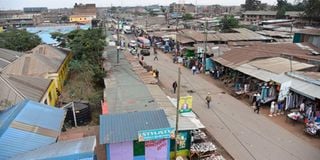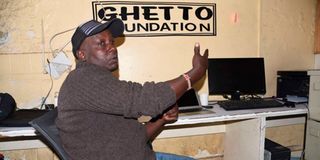Premium
In Nairobi, expectations abound but change seems elusive

A section of Dandora Estate in Embakasi North Constituency on July 19.
Mounds of garbage, impassable roads, stinking alleys and blocked drainages welcome one to Nairobi, the capital city of Kenya and the economic and financial hub of East Africa.
Biting poverty, surging crime rates, soaring unemployment among the youth, perennial traffic jams and poor services are commonplace in the city, even as elected leaders plunder public funds.
“When will we ever learn?” is a common question after every General Election among the Kenyan electorate after choosing poor leaders. It is no different in Nairobi. The chance to change leadership is rarely taken up. And things are no different in the coming election if sentiments across several of the city’s 17 constituencies are anything to go by.

From left Jared Obara, a friend, Godwin Onyango and Nicholas Juma at Bababadogo in Ruaraka, Nairobi on July 19, 2022.
Nairobi is a melting pot of different communities and with an adult literacy rate of 87.1 per cent, according to the Kenya National Bureau of Statistics – way above the national rate of 61.5 per cent – but both count for nothing during elections.
We pitched tent in Nairobi talking to ordinary citizens about their expectations and voting patterns. One thing was evident: Political parties and tribal arithmetic play an integral role in who ascends to leadership. Leadership skills or an individual’s track record are secondary.
Our first stop was Embakasi North, the home of the “notorious” Dandora dumping site. Noise and chaos welcomed us to the constituency, popularly known as D-City, with matatus stopping haphazardly on the road. But even before overcoming the shock, the putrid smell from garbage hits the nostrils.
Garbage
“There are a lot of muggings around here and garbage has become a stranger we have gotten used to living with. We also only get water thrice a week in this area,” said Eric Karanja, a boda boda rider we met at a shed. The other two, Alex Ngugi and James Mwaura, concurred with their friend, adding that insecurity is also a big problem.

A lorry ferrying garbage in Dandora, Nairobi on July 19, 2022.
We witnessed dozens of lorries full of garbage either parked by roads or being driven to the dumping site. Some of the garbage would drop on the road but the crews continued with their journeys unbothered.
Embakasi North is one of five constituencies carved out of the larger Embakasi constituency in the lead-up to the 2013 General Election. Others are Embakasi Central, Embakasi East, Embakasi West and Embakasi South.
The constituency is unique in its own way as it is made up of one big estate, Dandora, which is divided into five phases that also double up as wards: Dandora Area I, II, III and IV, and Kariobangi North. Rather than just geographical boundaries, the areas are either deliberately or by default, ethnic enclaves.
Mr Mwaura tells us that phases I, II, III and Kariobangi North are mostly dominated by Kikuyus while Luos are dominant in Phase IV. And it is for this reason that the constituency has primarily voted in leaders from the Kikuyu tribe or candidates vying on political parties appealing mostly to the community.
Since 2013, James Mwangi Gakuya has been the area MP. The lawmaker is eyeing a third term on a United Democratic Alliance (UDA) ticket after decamping from President Uhuru Kenyatta’s Jubilee Party. His closest challenger, as was in the last election, is Jane Wangui Muringi of ODM, who managed to take him to the wire in the last polls.
In Phase IV, where Mr Raila Odinga’s ODM enjoys more support, Patrick Otieno, 47, said in this election residents are keener on the person as opposed to political parties. But he reckons that it is near impossible to have an MP outside the Kikuyu community.
“Gakuya has done well with bursary allocations. We are focused on service delivery and not parties,” said Mr Otieno. “Insecurity is still a major challenge but that we know is a function of the national government.”
A female second-hand clothes seller who declined to be named, said she was sceptical that the incoming leadership would change her life.
“They are all looking for a job, not to help us, but to transform their lives and those of their families,” she said.
Mugabe Were
In 2007, the late Mugabe Were of ODM beat all odds to become a non-Kikuyu MP of the larger Embakasi constituency after Ferdinand Waititu and John Ndirangu split Kikuyu votes. But he was gunned down even before he could be sworn in.

Patrick Otieno during an interview in Dandora, Nairobi on July 19, 2022.
The other four Embakasi constituencies are also led along tribal lines, with the Kikuyu-dominated West and Central having MPs George Theuri and Benjamin Gathiru, respectively. The two stand high chances of being re-elected but even if they don’t, their closest challengers are from the same community.
The Kamba community dominates Embakasi South but party lines also have a say in the elections. The current MP, Julius Mawathe, is from the community.
In Embakasi East, incumbent Babu Owino broke Kikuyu domination after wresting the seat from Francis Mureithi in the 2017 elections.
Ruaraka residents – who are majority Luo – complain of poor services and an absentee MP in Tom Joseph (TJ) Kajwang, but they say they will still elect him because of his tribe and party,.
“TJ has done nothing. He has performed dismally. It is impossible to see him or get a bursary,” said Nicholas Juma, a second-hand clothes trader in Baba Dogo. The constituency is made up of Lucky Summer, Mathare North, Baba Dogo, Korogocho and Utalii wards. It was split from the larger Kasarani Constituency – whose leadership had been see-sawing between Luos and Kikuyus .
“He only keeps reminding us that he is the people’s ‘Chief Justice’ after swearing in the people’s president Mr Odinga. In fact, he says he risked treason to swear in Baba (Mr Odinga) and rides on being close to him,” added Mr Juma. Mr Kajwang is facing eight opponents with three being independent candidates. Mr Juma, however, predicts a win for Mr Kajwang after Azimio’s zoning plan gave the incumbent an upper hand.
Gordon Onyango and his friend Jared Obara echo Mr Juma’s sentiments, saying Mr Kajwang has a head start since he comes from the “right tribe” and is flying the ODM ticket.
“Most of the locals in the constituency align their aspirations with the ODM party,” offered Mr Onyango.
While he feels Mr Kajwang has performed well on the bursary front, he faults him on the water agenda, pointing at a nearby borehole that has not been put into use despite swallowing millions of shillings.
“We had streetlights here but they have since been removed and that means more insecurity,” he adds.
Mr Obara says that services in their ward have deteriorated and the youth in the area are mostly jobless even though the area has many light industries.
“We hope our leaders will seek an audience with the owners of these companies to get a quota for local graduates to benefit. As it is, we just see people being dropped off and picked up by the gates of the companies,” said Mr Obara.
It is the same story in Mathare Constituency where ODM commands more support than any other political party. Incumbent Anthony Oluoch is sitting pretty following zoning arrangements in Azimio, his tribe and his party’s popularity.
But singer Kevin Kioko Bahati of Jubilee, even after being prevailed upon to drop his bid under the Azimio zoning agreement, is adamant that he will vie.
While Bahati has rejected the appeal to back Mr Oluoch, Samuel Kiriro, who runs Ghetto Foundation at the heart of Mathare slums, explains that his bid will amount to nothing.
“Kikuyus are many here but they choose to vote elsewhere giving other tribes an upper hand, especially the Luos,” explained Mr Kiriro. “The only fear now is that Bahati will take away the Kamba vote, complicating matters for Mr Oluoch and in the process giving Billian Okoth Ojiwa of UDA an advantage.”

Samuel Kiriro during the interview at the Ghetto Foundation in Mathare, Nairobi on July 19, 2022.
Like in other constituencies, the incumbent’s work has not been felt, according to residents.
“For instance, people are wondering why he has not brought digital innovation hubs to Mathare yet he is part of the Ajira Digital Programme,” said Mr Kiriro.
Grappling with poverty
Mathare locals are still grappling with poverty, extra-judicial killings, joblessness and mental health issues. Mr Kiriro says getting men older than 25 years in the area is becoming a rarity because of these problems.
“When you get past the age of 25 without being arrested or executed you are lucky. It is survival for the fittest in this place,” he says. “There is also a high rate of teenage pregnancy; the government has criminalised poverty. People move far away after making it in life, meaning we do not have role models.”
That tribal arithmetic and political party affiliations play an integral role in city politics is not a new trend.
Roysambu (Waihenya Ndirangu, Jubilee) and Kasarani (Mercy Wanjiku Gakuya, Jubilee) voters have been aligning their politics with the Central Kenya voting patterns.
Kibra has Imran Okoth of ODM, Westlands Tim Wanyonyi of ODM and Starehe has Charles Njagua of Jubilee. It is highly likely that the next set of leaders will mirror the same pattern.






